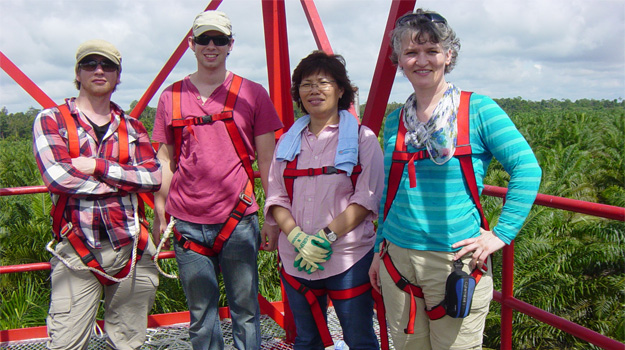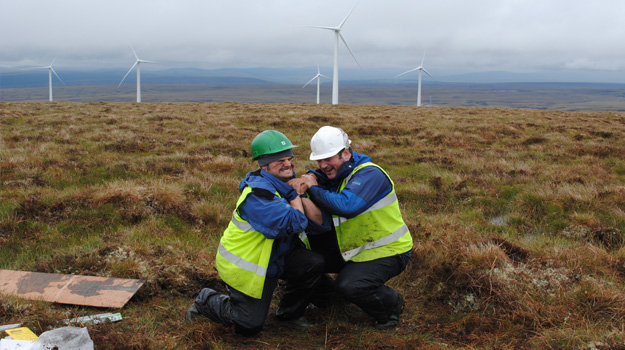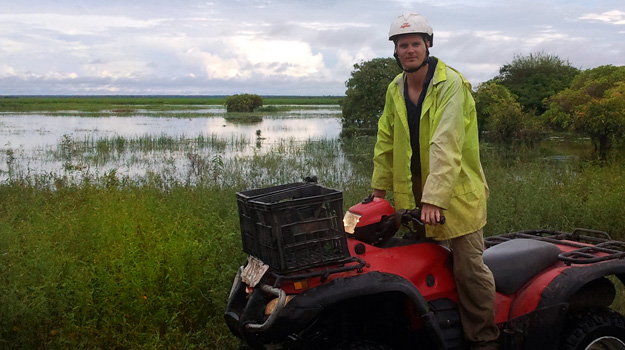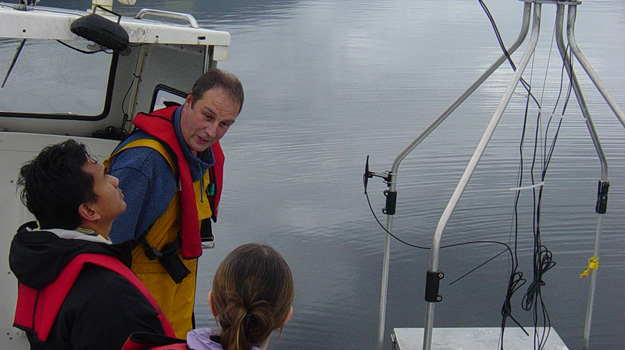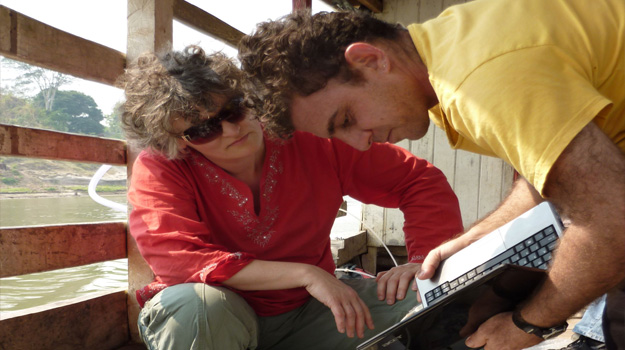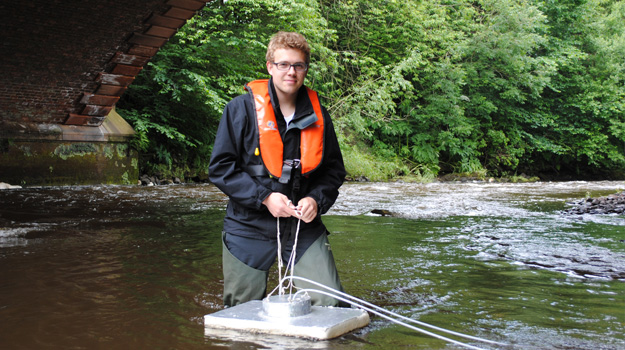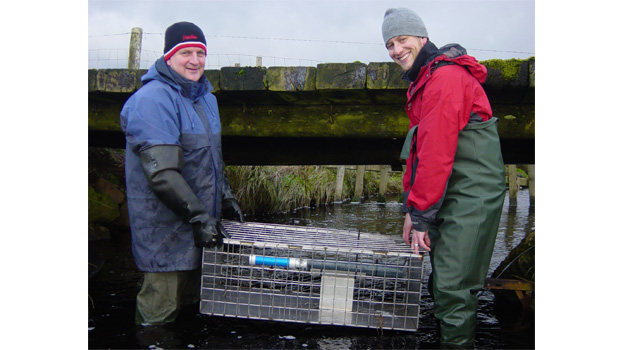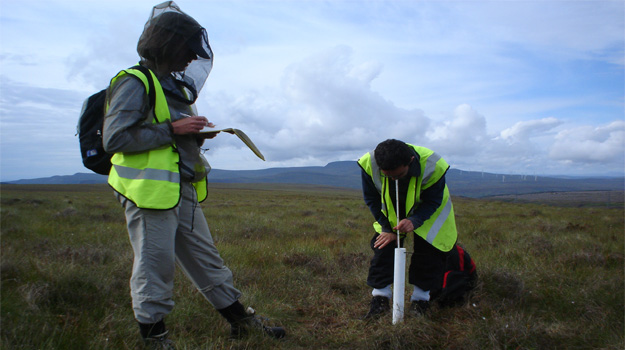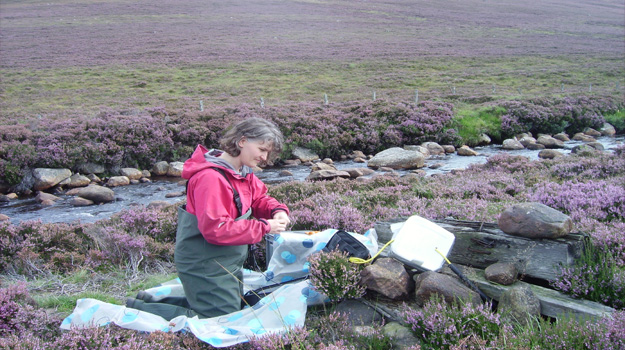People
Prof. Susan Waldron, Group leader of the Carbon Landscape Research Group.
 Susan holds a personal chair in Biogeochemistry. Her first degree was a B.Sc (Hons) in Applied Geology (1990) and her PhD was on ‘Stable Isotopic Composition of Bacteriogenic Methane Emissions’. After her PhD she managed for eight years the NERC Scientific Service ‘Life Sciences Community Stable Isotope Facility, East Kilbride’ which integrated research interests in carbon cycling with ecology. She left the Facility in 2002 to undertake a NERC Advanced Research Fellowship on ‘Under what conditions is a river under-saturated with CO2?’ and on completion of this Fellowship became a senior lecturer in the School of Geographical and Earth Sciences, University of Glasgow, before taking up the chair in 2010.
Susan holds a personal chair in Biogeochemistry. Her first degree was a B.Sc (Hons) in Applied Geology (1990) and her PhD was on ‘Stable Isotopic Composition of Bacteriogenic Methane Emissions’. After her PhD she managed for eight years the NERC Scientific Service ‘Life Sciences Community Stable Isotope Facility, East Kilbride’ which integrated research interests in carbon cycling with ecology. She left the Facility in 2002 to undertake a NERC Advanced Research Fellowship on ‘Under what conditions is a river under-saturated with CO2?’ and on completion of this Fellowship became a senior lecturer in the School of Geographical and Earth Sciences, University of Glasgow, before taking up the chair in 2010.
Since 1997 she has co-authored 79 peer-reviewed journal publications, and has a WoK h-index of 34.
Susan has just completed membership of NERC Science Committee (2016-19) and NERC Peer Review Council and co-led SAGES Terrestrial C research theme. She was Dean for Graduate Studies (2014-18) in The University of Glasgow College of Science & Engineering.
Current Group Members
Maricela Blair, Ph.D. student
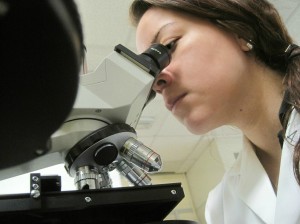 Maricela is a Scottish Government funded Hydronation doctoral candidate researching ‘Micro- and Nanoplastics in Wastewater Treatment Systems and Receiving Waters’. She is an interdisciplinary professional with a B.A. in Environmental Studies and Anthropology from St. Lawrence University in Canton, NY (2004) and MSc in Crop, Soil, and Environmental Sciences from the University of Arkansas at Fayetteville, AR (2007). She was awarded a British Chevening Scholarship for her Masters in Freshwater Sciences at the University of Glasgow (2011-12). Her MSc thesis project examined the relative contributions of DOC and water colour from the different inflows to a reservoir in a peatland-dominated wind farm catchment in Central Scotland. The project built on Scottish Water’s Amlaird WTW catchment monitoring programme and focused on Craigendunton Reservoir at Whitelee, from which raw water supplies for Amlaird WTW are obtained. Maricela is from The Honduras.
Maricela is a Scottish Government funded Hydronation doctoral candidate researching ‘Micro- and Nanoplastics in Wastewater Treatment Systems and Receiving Waters’. She is an interdisciplinary professional with a B.A. in Environmental Studies and Anthropology from St. Lawrence University in Canton, NY (2004) and MSc in Crop, Soil, and Environmental Sciences from the University of Arkansas at Fayetteville, AR (2007). She was awarded a British Chevening Scholarship for her Masters in Freshwater Sciences at the University of Glasgow (2011-12). Her MSc thesis project examined the relative contributions of DOC and water colour from the different inflows to a reservoir in a peatland-dominated wind farm catchment in Central Scotland. The project built on Scottish Water’s Amlaird WTW catchment monitoring programme and focused on Craigendunton Reservoir at Whitelee, from which raw water supplies for Amlaird WTW are obtained. Maricela is from The Honduras.
Iain Detrey, Ph.D. student (University of Highlands and Islands)
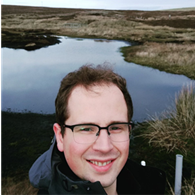 Iain is based at the UHI North Atlantic fisheries college in Shetland and is working in partnership with the Shetland gas plant. Built between 2010 and 2015 the Shetland gas plant was constructed on an area of blanket peatland. A novel decision was made to place the peat excavated during construction, an estimated 672,000m3, into storage within purpose built containers for use in the reconstruction of the landscape in approximately 30 to 40 years when the plant is decommissioned. As peat storage like this has not been attempted before Iain will be quantifying what effect the excavation and storage of the peat is having. In addition to this he will also be investigating methods of rapid revegetation to protect peat carbon and reinstate sequestration and making a carbon assessment of the peat stores as a method of carbon loss mitigation in peatland development. Before starting his PhD Iain worked as an environmental technician at a construction consultancy after completing an MSc in Wetland Science and conservation at Bangor University. Iain’s lead supervisor is Dr. Roxane Anderson. You can follow Iain on twitter here.
Iain is based at the UHI North Atlantic fisheries college in Shetland and is working in partnership with the Shetland gas plant. Built between 2010 and 2015 the Shetland gas plant was constructed on an area of blanket peatland. A novel decision was made to place the peat excavated during construction, an estimated 672,000m3, into storage within purpose built containers for use in the reconstruction of the landscape in approximately 30 to 40 years when the plant is decommissioned. As peat storage like this has not been attempted before Iain will be quantifying what effect the excavation and storage of the peat is having. In addition to this he will also be investigating methods of rapid revegetation to protect peat carbon and reinstate sequestration and making a carbon assessment of the peat stores as a method of carbon loss mitigation in peatland development. Before starting his PhD Iain worked as an environmental technician at a construction consultancy after completing an MSc in Wetland Science and conservation at Bangor University. Iain’s lead supervisor is Dr. Roxane Anderson. You can follow Iain on twitter here.
Sarah Buckerfield, Ph.D. student (University of Stirling)
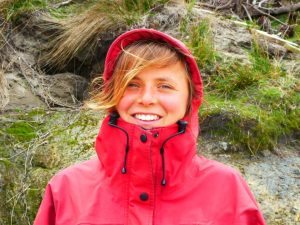 After completing a degree in geology with honours in groundwater chemistry at The Australian National University Sarah worked at Geoscience Australia on a range of projects including groundwater resource assessment, geophysics assessment of regolith cover, and GIS projects. She is on leave from this position to undertake a PhD on microbial groundwater contamination in southwest China. The project aims to understand hydrological and land-use controls on microbial pollution and human health risks in the southwest China karst region. The project sits within a large multidisciplinary NERC co-funded UK-China project. The results should help inform management of this fragile ecosystem for human health and environmental needs. Sarah’s lead supervisor is Dr. David Oliver and she is funded through the NERC IAPETUS DTP. You can follow Sarah on twitter here.
After completing a degree in geology with honours in groundwater chemistry at The Australian National University Sarah worked at Geoscience Australia on a range of projects including groundwater resource assessment, geophysics assessment of regolith cover, and GIS projects. She is on leave from this position to undertake a PhD on microbial groundwater contamination in southwest China. The project aims to understand hydrological and land-use controls on microbial pollution and human health risks in the southwest China karst region. The project sits within a large multidisciplinary NERC co-funded UK-China project. The results should help inform management of this fragile ecosystem for human health and environmental needs. Sarah’s lead supervisor is Dr. David Oliver and she is funded through the NERC IAPETUS DTP. You can follow Sarah on twitter here.
Roseanne McDonald, Ph.D. student (CEH)
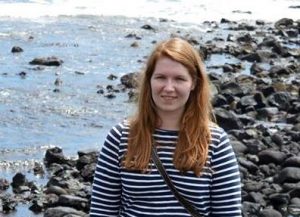 Rosie’s project ‘Greenhouse Gas Release from UK Reservoirs’ is funded through the NERC IAPETUS DTP with CASE enhancement from Scottish Water. Her project aims to understand carbon and nitrogen dynamics in drinking water reservoirs, their catchments, and drawdown area sediments across Scotland and North Wales, through a combination of field and lab based measurements. During her PhD, Rosie undertook a NERC-SAGES innovation internship at ClimateXChange where she produced a policy report on Sustainable Urban Drainage Systems. She has also worked as a GHG researcher at the Centre for Ecology & Hydrology on the land use, land use change and forestry (LULUCF) sector of the UK national greenhouse gas inventory. Prior to her PhD, Rosie completed an M.Sc. in Environmental Protection and Management from the University of Edinburgh and a B.Sc in Geography from the University of Aberdeen. You can follow Rosie on twitter here or find out more on her website.
Rosie’s project ‘Greenhouse Gas Release from UK Reservoirs’ is funded through the NERC IAPETUS DTP with CASE enhancement from Scottish Water. Her project aims to understand carbon and nitrogen dynamics in drinking water reservoirs, their catchments, and drawdown area sediments across Scotland and North Wales, through a combination of field and lab based measurements. During her PhD, Rosie undertook a NERC-SAGES innovation internship at ClimateXChange where she produced a policy report on Sustainable Urban Drainage Systems. She has also worked as a GHG researcher at the Centre for Ecology & Hydrology on the land use, land use change and forestry (LULUCF) sector of the UK national greenhouse gas inventory. Prior to her PhD, Rosie completed an M.Sc. in Environmental Protection and Management from the University of Edinburgh and a B.Sc in Geography from the University of Aberdeen. You can follow Rosie on twitter here or find out more on her website.
Dr. Hu Ding, Karst fluvial CO2 efflux PDRA, 2016-19.
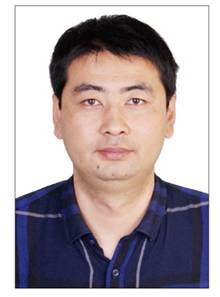 Hu comes from China, where he got his B.Sc in Geological Science (Lanzhou University, 2005) and PhD in Environmental Geochemistry (Institute of Geochemistry, Chinese Academy of Sciences (CAS), 2011). He has taken leave from a post as an associate professor at Institute of Geochemistry, CAS to take a 3 year PDRA position. Funded by NERC, his research focuses on the CO2 efflux from fluvial systems of karst landscapes at South China. The research will quantify the efflux of atmospheric CO2 degassing from rivers in karst systems, distinguish between different source of carbon in the rivers using chemical tracers, quantify how much C comes from the different sources and how these contributions change with different land use change, or as season and river flow change, and finally create a process-based model to supports global C cycle modelling.
Hu comes from China, where he got his B.Sc in Geological Science (Lanzhou University, 2005) and PhD in Environmental Geochemistry (Institute of Geochemistry, Chinese Academy of Sciences (CAS), 2011). He has taken leave from a post as an associate professor at Institute of Geochemistry, CAS to take a 3 year PDRA position. Funded by NERC, his research focuses on the CO2 efflux from fluvial systems of karst landscapes at South China. The research will quantify the efflux of atmospheric CO2 degassing from rivers in karst systems, distinguish between different source of carbon in the rivers using chemical tracers, quantify how much C comes from the different sources and how these contributions change with different land use change, or as season and river flow change, and finally create a process-based model to supports global C cycle modelling.
Dr. Fu-Jun Yue, China Karst Critical Zone Functioning PDRA 2016-19
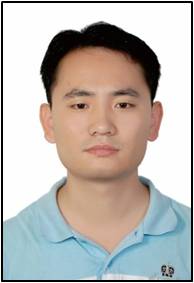 Fu-Jun Yue came to the group as the postdoctoral research associate from February, 2016. His research expertise is in environmental geochemistry, using stable isotopes (C, N, S, O) to understand environmental change and human activities. His was awarded his PhD in 2013 at Institute of Geochemistry, Chinese Academy of Sciences on ‘Identifying sources and biogeochemical transformation of nitrate in different watersheds based on dual isotopes’. Prior to joining us he undertook postdoctoral research to understand the contribution of internal nitrogen to the lacustrine nitrogen dynamic cycle. His research within the NERC-NSFC funded Critical Zone project focuses on identifying the source of nutrients and their loading, how this changes with time and land use. Key interests are how are macronutrients are attenuated with transport, within different land use units and with changing fluvial stoichiometry.
Fu-Jun Yue came to the group as the postdoctoral research associate from February, 2016. His research expertise is in environmental geochemistry, using stable isotopes (C, N, S, O) to understand environmental change and human activities. His was awarded his PhD in 2013 at Institute of Geochemistry, Chinese Academy of Sciences on ‘Identifying sources and biogeochemical transformation of nitrate in different watersheds based on dual isotopes’. Prior to joining us he undertook postdoctoral research to understand the contribution of internal nitrogen to the lacustrine nitrogen dynamic cycle. His research within the NERC-NSFC funded Critical Zone project focuses on identifying the source of nutrients and their loading, how this changes with time and land use. Key interests are how are macronutrients are attenuated with transport, within different land use units and with changing fluvial stoichiometry.
Dr. Ying Zheng, China Karst Critical Zone Functioning KE PDRA 2016-19
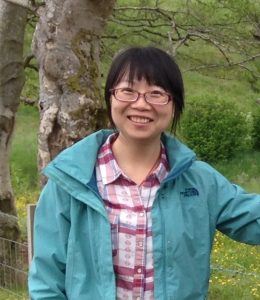 Ying completed her PhD in 2018, funded by the CSC (China Scholarship Council) and the University of Glasgow. She joined us in 2013, having studied Environmental Sciences as an undergraduate in Hunan University, China (2008-2012), and undertaking one year of Environmental Management in Xiamen University before coming to Glasgow. Her research focused on potential impacts of wind farm construction and related land use changes on fluvial dissolved organic carbon (DOC) composition, and decomposition in aquatic systems. Field research involved a year-long survey of DOC concentration and chemical composition in a peaty catchment in Glasgow, draining the edge of Whitelee windfarm. With knowledge of DOC seasonal and spatial composition variation from the survey, Ying explored how the differed composition impacts DOC biodegradation, which can influence C emission from streams. Since completing her doctoral thesis, Ying has been working as a PDRA responsible for knowledge exchange on the China Karst Critical Zone Functioning research programme.
Ying completed her PhD in 2018, funded by the CSC (China Scholarship Council) and the University of Glasgow. She joined us in 2013, having studied Environmental Sciences as an undergraduate in Hunan University, China (2008-2012), and undertaking one year of Environmental Management in Xiamen University before coming to Glasgow. Her research focused on potential impacts of wind farm construction and related land use changes on fluvial dissolved organic carbon (DOC) composition, and decomposition in aquatic systems. Field research involved a year-long survey of DOC concentration and chemical composition in a peaty catchment in Glasgow, draining the edge of Whitelee windfarm. With knowledge of DOC seasonal and spatial composition variation from the survey, Ying explored how the differed composition impacts DOC biodegradation, which can influence C emission from streams. Since completing her doctoral thesis, Ying has been working as a PDRA responsible for knowledge exchange on the China Karst Critical Zone Functioning research programme.
Zheng, Ying (2018) Exploring how land use may influence the export, composition, and reprocessing of dissolved organic carbon in peat-rich catchment drainage. PhD thesis, University of Glasgow. http://theses.gla.ac.uk/8990/
